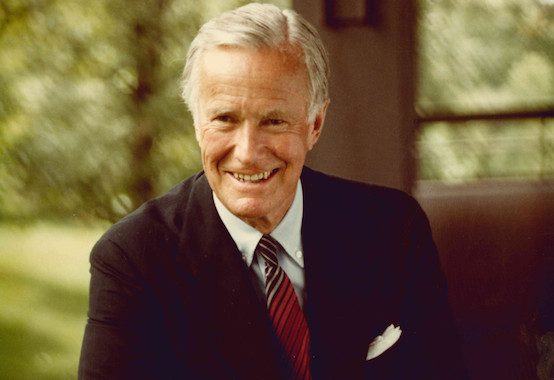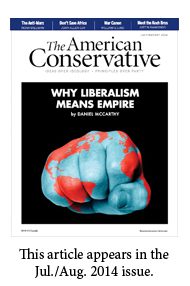Still America First

Robert Douglas “Bob” Stuart Jr., who died in May at the age of 98, helmed two of the 20th-century Midwest’s flagship cultural enterprises: Quaker Oats and the America First Committee. A dozen or so years ago, I helped Mr. Stuart assemble and write a private memoir for his family. What a strange and rewarding experience that was: I would spend mornings reading through boxes of old letters exchanged between his father and young Bob, away at the Los Alamos Ranch School—alma mater of Gore Vidal and William S. Burroughs—and Princeton; and then in the afternoon I would interview the bright-eyed and vigorous octogenarian who used to be that boy.
We had oatmeal at every breakfast. Never had I dreamed of that porridge’s gustatory potential! But then the Stuart family knew oatmeal. Bob’s grandfather co-founded Quaker Oats. His father was president and CEO of the family business, as was Bob. Both men also served as a U.S. ambassador: father, under Eisenhower, to Canada; son, under Reagan, to Norway.
Bob Stuart was an unpretentious Scots-Presbyterian (“I’ve always believed that I should work a little harder than the next guy and never show off”) grounded in Lake Forest, Illinois. But as the obituaries noted, he played a signal role in American political history.
In September 1940, Bob Stuart and several Yale Law School classmates—including future President Gerald Ford and future Supreme Court Justice Potter Stewart—founded the America First Committee, the largest antiwar organization in American history. Their law professor Fred Rodell later wrote in The Progressive—before Vietnam—that America First was “the only important U.S. political movement ever sparked and kindled by youngsters.” (Gerald Ford quit when he feared his involvement might jeopardize his position as assistant football coach at Yale. A profile in courage!)
Speaking of which, there were Kennedy footprints all over America First. Old lech Joe Kennedy kicked in a few bucks, and John F. Kennedy sent the AFC a check for $100, with a note reading “what you all are doing is vital.” Mr. Stuart’s long-time friend Sargent Shriver, Kennedy in-law and the last pro-life Democrat to run on the national ticket, was present at the creation.
Mr. Stuart said that the disastrous entry of the U.S. into the slaughterhouse of World War I was his motivation in founding the AFC. He saw the new European war as a continuation of the previous one, and he wanted no part of it for his country.
The America First story has been told well by historians Justus Doenecke and Wayne Cole. Its personalities ranged from Main Street Republicans to prairie populists, from pacifist novelists to Midwestern manufacturers. Behind its banner stood figures as various as Socialist Norman Thomas, American Legion commander Hanford MacNider, and Sears Roebuck chairman Robert E. Wood. And, of course, Charles Lindbergh.
As a boy, Bobby Stuart fantasized about Lucky Lindy making an emergency landing in his backyard. Flash forward to 1941: Lindbergh, who despite his decidedly non-jocular public demeanor “was actually very easygoing in private,” according to Mr. Stuart, was flying with Bob throughout the Midwest, occasionally turning the controls over to the starstruck young man for a flying lesson.
I asked Mr. Stuart if Lindbergh—who in his famous Des Moines speech of September 11, 1941, said that “the British, the Jewish, and the Roosevelt Administration” were “the three most important groups” pushing the country into war—ever expressed anti-Semitic sentiments to him.
“Never,” he replied. Mr. Stuart said that he asked Lindbergh after the speech why he had said what he had and whether he understood the damage he had done to the antiwar cause.
“Bob, be realistic, I’m right,” responded Lindbergh bluntly. “If it’s right, I should say it.” And that was the end of that conversation. 
After Pearl Harbor, America First disbanded. Bob Stuart reported to Fort Sill for artillery school, while many of the interventionist polemicists who had baited America Firsters as dreamy peaceniks found that wartime journalism better suited their talents.
Postbellum, Mr. Stuart chose Quaker because it “was in my blood.” He was by all accounts a humane CEO, well-liked by employees, and saddened when in his retirement Quaker was swallowed up by PepsiCo.
Peace is usually a rotten career move for the ambitious, but the America First connection never came up in Mr. Stuart’s ambassadorial confirmation hearing. Nor did it harm JFK, Shriver, or Stewart, for that matter. Their coevals had lived through that era, and they understood that the America First Committee was in the broad tradition of American political activism.
My background is small-town populist; Bob Stuart’s was patrician business Republican. Yet we got on terrifically well—just as he had with my ancestors in 1940, before war became the permanent American condition.
Bill Kauffman is the author of ten books, among them Dispatches from the Muckdog Gazette and Ain’t My America.
Comments